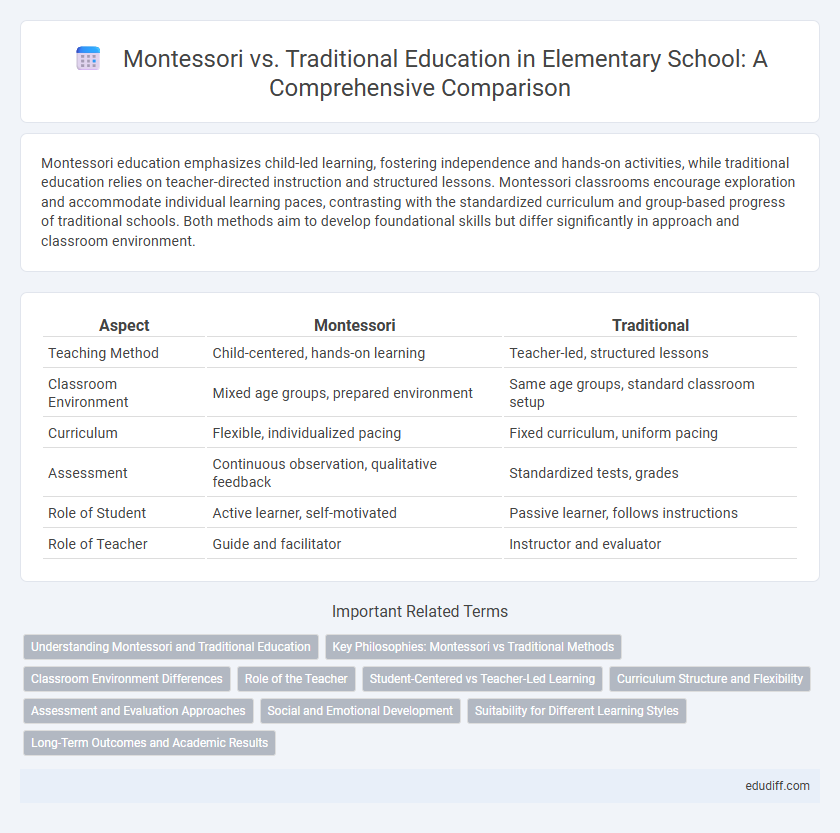Montessori education emphasizes child-led learning, fostering independence and hands-on activities, while traditional education relies on teacher-directed instruction and structured lessons. Montessori classrooms encourage exploration and accommodate individual learning paces, contrasting with the standardized curriculum and group-based progress of traditional schools. Both methods aim to develop foundational skills but differ significantly in approach and classroom environment.
Table of Comparison
| Aspect | Montessori | Traditional |
|---|---|---|
| Teaching Method | Child-centered, hands-on learning | Teacher-led, structured lessons |
| Classroom Environment | Mixed age groups, prepared environment | Same age groups, standard classroom setup |
| Curriculum | Flexible, individualized pacing | Fixed curriculum, uniform pacing |
| Assessment | Continuous observation, qualitative feedback | Standardized tests, grades |
| Role of Student | Active learner, self-motivated | Passive learner, follows instructions |
| Role of Teacher | Guide and facilitator | Instructor and evaluator |
Understanding Montessori and Traditional Education
Montessori education emphasizes hands-on learning, self-directed activity, and collaborative play, fostering independence and critical thinking in elementary students. Traditional education follows a structured curriculum with teacher-led instruction and standardized assessments, focusing on foundational knowledge and discipline. Understanding these differences helps parents and educators choose the best approach for a child's developmental needs and learning style.
Key Philosophies: Montessori vs Traditional Methods
Montessori education emphasizes self-directed learning, hands-on activities, and fostering independence, allowing children to explore at their own pace within a prepared environment. Traditional methods typically follow a structured curriculum led by the teacher, focusing on standardized instruction and assessment to ensure consistency. Montessori classrooms encourage collaborative play and sensory-based experiences, whereas traditional classrooms prioritize direct instruction and memorization.
Classroom Environment Differences
Montessori classrooms feature mixed-age groups, open shelving with accessible materials, and a focus on individualized learning, promoting independence and hands-on exploration. Traditional classrooms typically have same-age students, teacher-directed instruction, and structured seating arrangements, emphasizing group activities and standardized curricula. These environmental differences influence student engagement and learning styles, with Montessori fostering autonomy and traditional settings focusing on uniformity and discipline.
Role of the Teacher
In Montessori education, the teacher acts as a guide and facilitator, fostering independence and allowing students to explore materials at their own pace. Traditional classrooms typically emphasize the teacher's role as the primary source of knowledge, delivering structured lessons and managing classroom activities. This fundamental difference shapes student engagement and learning outcomes, with Montessori teachers encouraging self-directed learning and traditional teachers providing direct instruction.
Student-Centered vs Teacher-Led Learning
Montessori education emphasizes student-centered learning, allowing children to explore and engage with materials at their own pace, fostering independence and intrinsic motivation. Traditional classrooms often follow a teacher-led approach, where instructors direct lessons and students follow structured guidance. This fundamental difference impacts how learners develop critical thinking, problem-solving skills, and autonomy in elementary education settings.
Curriculum Structure and Flexibility
Montessori curriculum emphasizes individualized learning plans tailored to each child's pace, promoting hands-on activities and self-directed exploration. Traditional curriculum follows a fixed, standardized syllabus with structured lessons and teacher-led instruction, prioritizing uniform progress across all students. Flexibility in Montessori allows adaptation to diverse learning styles, while traditional models maintain consistent pacing and content delivery.
Assessment and Evaluation Approaches
Montessori assessment emphasizes individualized observation and qualitative feedback to track student progress, rather than standardized tests common in traditional education. Traditional assessment relies heavily on exams and grades to measure knowledge acquisition and compare student performance. This difference reflects Montessori's focus on developmental readiness and process over product, promoting intrinsic motivation and self-paced learning.
Social and Emotional Development
Montessori education promotes social and emotional development by encouraging self-directed learning, collaborative activities, and respect for others, fostering independence and empathy in elementary students. Traditional education often relies on teacher-led instruction and structured social interactions, which can limit opportunities for children to develop strong emotional self-regulation and peer cooperation skills. Research indicates that Montessori students tend to exhibit higher emotional resilience and social competence compared to their peers in traditional classrooms.
Suitability for Different Learning Styles
Montessori education caters to various learning styles by offering hands-on activities and self-paced exploration, ideal for kinesthetic and visual learners. Traditional education often relies on structured lessons and verbal instruction, which can benefit auditory learners who thrive on direct teaching. Both approaches can support diverse learners, but Montessori's individualized approach may better accommodate unique learning preferences in elementary students.
Long-Term Outcomes and Academic Results
Montessori education emphasizes self-directed learning, fostering critical thinking and creativity, which often leads to higher long-term academic achievement and improved social skills compared to traditional methods. Studies indicate Montessori students frequently outperform peers in standardized tests, demonstrating stronger problem-solving abilities and persistence. Traditional education, with its structured curriculum, provides foundational knowledge but may not cultivate the same level of independent learning crucial for lifelong success.
Montessori vs Traditional Infographic

 edudiff.com
edudiff.com